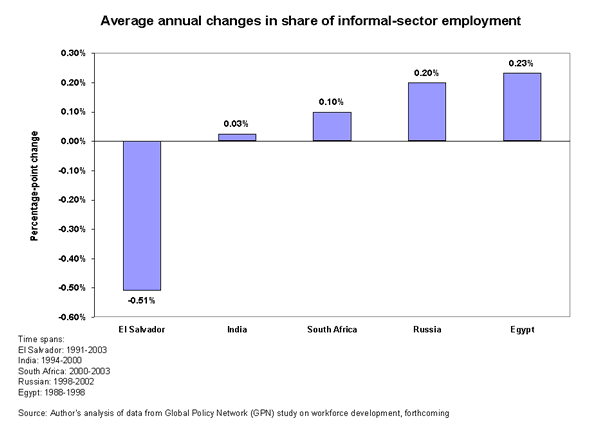See Snapshots Archive.
Snapshot for July 28, 2004
Growing “informalization” of employment in the developing world
Informal employment is a significant part of many economies in the developing world. Some of what accounts for “informal” employment is familiar even to the most casual observers: street vending and shoeshine stations in the large cities of the developing world, for example. Much informal employment, however, is a less visible feature of an economy’s landscape, such as home-based garment assembly and industrial waste recycling.
The Global Policy Network (GPN) has undertaken a detailed study of informal employment in five countries, and will issue a report later this year on its findings. The study defines informal-sector employment predominantly based upon whether or not workers had an employment contract and whether or not jobs provided for the receipt of any of a set of key benefits (including access to government-provided social insurance). Essentially, jobs that are not covered by a contract and do not provide access to (public or private) pensions, health, disability, unemployment insurance, sick leave, holidays, or vacation benefits are considered informal.
The figure below illustrates a basic finding of the forthcoming study: informal employment is growing as a share of total employment in four of the five countries examined. The bars represent percentage-point changes informal-sector employment as a share of total employment.

There are a number of reasons to be concerned about the persistence and growth of informal employment in the developing world. Such employment is often characterized by poor working conditions, both in terms of remuneration and the existence and/or enforcement of basic labor standards. Further, informal employment can leave too many workers frozen out of the networks they need to insert themselves higher up the global value-chains that their labor so often serves.
Today’s Snapshot was written by EPI economist Josh Bivens.
More information on informalization and related topics will be included in the GPN report scheduled for release later this year. For reports on labor market conditions in a range of developing countries, see www.gpn.org.
